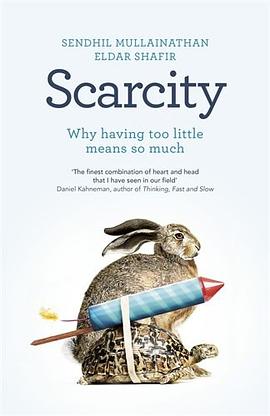

具體描述
A surprising and intriguing examination of how scarcity—and our flawed responses to it—shapes our lives, our society, and our culture
Why do successful people get things done at the last minute? Why does poverty persist? Why do organizations get stuck firefighting? Why do the lonely find it hard to make friends? These questions seem unconnected, yet Sendhil Mullainathan and Eldar Shafir show that they are all are examples of a mind-set produced by scarcity.
Drawing on cutting-edge research from behavioral science and economics, Mullainathan and Shafir show that scarcity creates a similar psychology for everyone struggling to manage with less than they need. Busy people fail to manage their time efficiently for the same reasons the poor and those maxed out on credit cards fail to manage their money. The dynamics of scarcity reveal why dieters find it hard to resist temptation, why students and busy executives mismanage their time, and why sugarcane farmers are smarter after harvest than before. Once we start thinking in terms of scarcity and the strategies it imposes, the problems of modern life come into sharper focus.
Mullainathan and Shafir discuss how scarcity affects our daily lives, recounting anecdotes of their own foibles and making surprising connections that bring this research alive. Their book provides a new way of understanding why the poor stay poor and the busy stay busy, and it reveals not only how scarcity leads us astray but also how individuals and organizations can better manage scarcity for greater satisfaction and success.
作者簡介
Sendhil Mullainathan is Professor of Economics at Harvard University. His real passion is behavioral economics, understanding what makes people tick - whether a senior executive in New York or a farmer in rural Tamil Nadu.
He enjoys having written but is of a mixed mind about writing.
He also occasionally enjoys doing: he helped co-found a non-profit to apply behavioral science (ideas42); and has worked in government.
Much to the surprise of who know him well, he is a recipient of the MacArthur "genius" award.
His hobbies include basketball, googling and fixing-up classic espresso machines. He also enjoys speaking about himself in the third person, which works well for bios but less well in daily life.
Eldar Shafir is an American psychologist, and the author of Scarcity: Why Having Too Little Means So Much[1] (with Sendhil Mullainathan). He is the William Stewart Tod Professor of Psychology and Public Affairs at Princeton University Department of Psychology and the Woodrow Wilson School of Public and International Affairs. He is a Faculty Associate at the Institute for Quantitative Social Science at Harvard University. He is co-founder and Scientific Director at ideas42, a social-science R&D lab. His area of study is behavioral economics, that is, how the decisions people make affect their financial outcomes. His research has led him to the general conclusion that people often make inadvisable decisions on financial matters when they think they are being rational.
目錄資訊
Chap. 1 - The good: scarcity can cause focus. The bad: focus can mean inattention to other things.
Chap. 2 - Scarcity causes an internal disruption that makes it harder to make good decisions.
Chap. 3 - Slack (the opposite of scarcity) allows better choices and reduces the bad consequences of failiure.
Chap. 4 - Poor people are sometimes more realistic about estimating costs, because they have to be.
Chap. 5 - Borrowing when you're short of cash leads to a descending spiral of debt.
Chap. 6 & 7 - Poverty is a vicious circle of scarcity leading to bad decisions leading to scarcity...
Chap. 8 - Poverty can be alleviated by creating slack, such as extra cash or day care to create more time.
Chap. 9 - Efficient use of resources and division of labor helps organizations become more efficient.
Chap. 10 - Efficient use of self-control helps with life issues.
· · · · · · (收起)
讀後感
我没看过这本书,为什么要写书评? 这是我至今唯一一本没有看过就写书评的书。我看了目录和其他人的书评,关于匮乏,我有话要讲。 是心态。 如果缺时间,就不会想要15分钟后再吃棉花糖,就不会坚持锻炼,就不会觉得睡眠是最大的投资。 如果缺钱,就不会考虑学习,不会考虑投...
評分对于经历过高考的人,想必也知道我们的老师常常强调时间的重要性,因此在高中,路上背单词,排队打饭背古文的人不在少数。然而一旦走出高中,你很快就会发现你再也没有这种如此完美的情况了。 我遇见挺多考不过4、6级的大学生总是抱怨自己没有很多时间准备考试,他...
評分《稀缺》我们是如何陷入贫穷与忙碌的。关于稀缺的定义是拥有少于需要的感觉。现象:钱的问题会永远纠缠着穷人,时间问题只会永远烦扰着忙碌之人。你是否遇到这样的事情: 1.要做的事情太多,而用来要做事情的时间又太少,许多事情早就过了原定的截止日期一直在延期越来越让人担...
評分 評分《稀缺》我们是如何陷入贫穷与忙碌的。关于稀缺的定义是拥有少于需要的感觉。现象:钱的问题会永远纠缠着穷人,时间问题只会永远烦扰着忙碌之人。你是否遇到这样的事情: 1.要做的事情太多,而用来要做事情的时间又太少,许多事情早就过了原定的截止日期一直在延期越来越让人担...
用戶評價
經濟上的貧睏往往伴隨時間與精力上的貧睏
评分非常棒的一本書,從一開始對美國人囉嗦的不屑。到最後對解釋力和應用範圍的敬佩,沒有單獨講和commitment device的聯係是個遺憾 。讀到一身冷汗。
评分#有點兒意思
评分很有啓發。四星+,如果再簡潔一點就是五星瞭。這裏的scarcity,和微觀經濟學中的同一個詞並非一個意思,後者是抽象的“稀缺”(即"constraint binds"),而前者譯為“匱乏”更閤適——它指的是對資源的高度缺乏和與之相伴的“mindset"。
评分Manage our bandwidth like we try managing time.
相關圖書
本站所有內容均為互聯網搜索引擎提供的公開搜索信息,本站不存儲任何數據與內容,任何內容與數據均與本站無關,如有需要請聯繫相關搜索引擎包括但不限於百度,google,bing,sogou 等
© 2025 qciss.net All Rights Reserved. 小哈圖書下載中心 版权所有




















